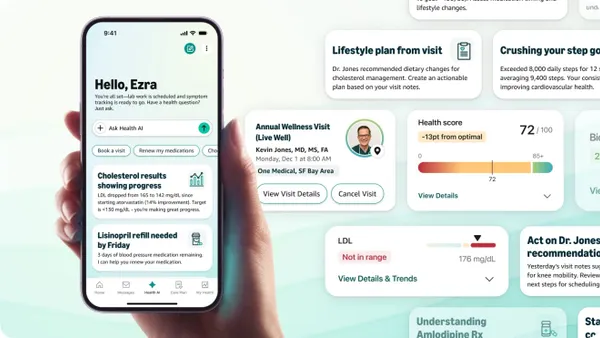I believe one of the reasons for only incremental growth of value-based care is the lack of access health systems have to timely, comprehensive data and the actionable insights required to effectively manage the care of a patient population. Oracle Health Data Intelligence is a solution available today to help health systems put their data into action. It continuously and securely integrates patient data from a wide range of sources—clinical, claims, revenue cycle, social determinants, pharmacy, and more—to deliver insight across back office and point-of-care workflows. As a result, providers gain a more complete view of their patients and populations and benefit from suggested next best actions to optimize care and financial performance.
I recently spoke with Chad Smith, MD, Chief Population Health Officer at Marshall Health Network, about how his team uses Oracle Health Data Intelligence to drive value-based care and better serve the health needs of the population of West Virginia and its surrounding communities.
Verma: Tell us more about Marshall Health Network, your mission, and the communities you serve.
Smith: We are a not-for-profit academic health system that serves nearly 1.4 million patients across West Virginia, southern Ohio, and eastern Kentucky, with four hospitals, including teaching hospitals and a pediatric specialty, and multiple physician practices. Our mission is six words: advancing health, inspiring hope, and serving you. We want to inspire hope in our communities by advancing healthcare, promoting economic opportunity, and serving the people that we treat.
Verma: Can you share some of the more impactful ways you've leveraged the technology to support your strategic and operational goals?
Smith: One example that is gaining a lot of attention both within our state and regionally is a project to identify the patients in our system who are overdue for colorectal cancer screenings. Over the past few years, the number of patients we've screened year-over-year had plateaued. One of the primary reasons, we believe, is that colonoscopies are not popular due to the time and preparation involved. We were able to utilize key criteria already built into Oracle Health Data Intelligence to identify all patients in need of screenings but who hadn’t taken any actions to be screened. We worked with a vendor to provide mail-in test kits to patients so they could easily provide a sample and return via mail. As a result, colorectal cancer patient screenings are up 10%. More importantly, if the mail-in kit shows a positive test, we contact patients to schedule a colonoscopy as a next step. This proactive approach helps improve quality of life for our patients and reduces cost of care.
Verma: How do you view Oracle Health Data Intelligence as a tool for operational efficiency and as a catalyst for growth?
Smith: With insights from Oracle Health Data Intelligence, we discovered powerful opportunities to enhance primary care advocacy across our health system for the communities we serve. The data revealed that by better optimizing visit opportunities—and applying embedded risk factor scoring—we can help patients with chronic conditions receive the proactive, consistent care they need throughout the year. While our current provider footprint doesn’t yet meet the full demand, this insight gives us a clear, data-driven path to growth. We can now strategically determine where to add new sites and providers to best serve our population. Oracle Health Data Intelligence makes it possible to evaluate risk, analyze longitudinal data on co-morbid and chronic conditions, and assess operational efficiency—giving us the evidence we need to make the most impactful growth decisions. It’s become a catalyst for expanding and strengthening our primary care model.
Verma: Can you describe the complex healthcare landscape in West Virginia and how Marshall Health Network leverages value-based care to meet the needs of their most vulnerable populations?
Smith: Value-based care approach helps us better meet the needs of our populations by addressing social determinants of health (SDOH). When a SDOH is identified, we have an internal program called Faith Health Appalachia to help patients overcome barriers to obtain medical care. Value-based care also helps us more cost-effectively support the needs of Medicare and Medicaid populations.
Verma: As you know, we are embedding several advanced AI capabilities into Oracle Health Data Intelligence. How do you see the innovations in AI enhancing your value-based care strategy going forward?
Smith: Value-based care strategies succeed when adequate risk recapture is present. Some of the AI-enhancing capabilities we see as opportunities for improvement range from ambient listening to advances in patient care insights, and we will continue to engage as AI matures. We would also like to implement AI enhancements related to individual patient care management. Having AI bring next-best actions to the care manager's attention, summarize an overwhelming amount of information into individualized recommendations, and be available at a provider’s fingertips could revolutionize value-based care.
We believe AI will help our clinicians and staff address patient issues at the point of care, so they don’t have to focus on documentation, which has become so burdensome for providers. A lot of missed risk captures occur because of documentation or cumbersome systems that aren’t standardized across the system. We believe ambient listening and other features embedded in the AI agents will help drive improved risk capture and outcomes while also reducing provider burden.
Verma: What key takeaways and lessons learned would you share with other healthcare organizations about your experience with Oracle Health Data Intelligence?
Smith: Users should expect to take ownership of how the solution works, have the proper internal resources in place to support both implementation and ongoing maintenance, and team closely with Oracle Health to use the data and analytics to achieve goals and create meaningful clinical impact.
For example, we have embedded the Oracle Health consulting team that works in tandem with our internal team. They bring us valuable resources, input, and thoughts that allow us to drive measurable outcomes. Our Oracle Health team has been fundamental in helping us launch a provider incentive program around quality measures. This has resulted in happier providers who are continuing to break the plateaus in quality measures because we have reliable data to build upon.










